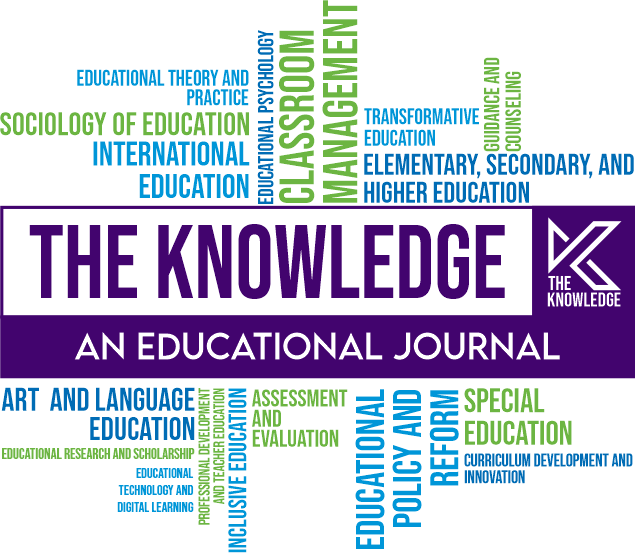Gamification in Education: Enhancing the Students Engagement and Learning Achievements through the Integration Use of Game based Learning
DOI:
https://doi.org/10.63062/tk/2k24a.31016Keywords:
Learning Games, Educational Games, Interactive Student Participation, Teaching Success, Numerical EvaluationAbstract
The aim of this study is to determine the impact of gamification in encouraging learners' involvement, achievement and learning activities within learning institutions. Here, game characteristics include the issuance of points, competition, incentives, and feedback mechanisms to be used in game force. The goal of integrating these elements into the conventional contexts of teaching and learning approach is, therefore, to determine whether the application of gamified features can increase students' engagement and consequently improve their academic performance. Consequently, this research employs a quantitative research paradigm to capture and explain the effects of gamification on learning behaviors and performance. The study will compare two distinct groups: The first class will be introduced to learning through games, whereas the second class will be taught in a normal, conventional manner. Questionnaires will be used as data collection tools so that both groups will complete questionnaires about their learning experiences, interests and perceived learning achievements. Through the analyses of these surveys, the present research aims to establish whether gamification can help enhance engagement and learning achievements over traditional stimuli. This research aims to provide enlightening results that help to answer the question of whether it is possible to make use of the means of games to enhance the learning activities and students' activity and results, thus enriching the field of educational technology. Besides, the study may also provide recommendations to instructors in terms of creating bespoke and relevant teaching and learning environments that can enhance learning outcomes for learners of different profiles.
References
Barata, G., Gama, S., & Jorge, J. (2013). The influence of gamification on students' engagement in a university course. 2013 IEEE Global Engineering Education Conference (EDUCON) (pp. 876-883). IEEE.
Clark, D. B., Tanner-Smith, E. E., & Killingsworth, S. S. (2016). Digital games, design, and learning: A systematic review and meta-analysis. Review of Educational Research, 86(1), 79–122. https://doi.org/10.3102/0034654315582065
Deterding, S., Dixon, D., Khaled, R., & Nacke, L. (2011). From game design elements to gamefulness: defining" gamification". In Proceedings of the 15th international academic MindTrek conference: Envisioning future media environments (pp. 9-15).
Domínguez, A., Saenz-de-Navarrete, J., de-Marcos, L., Fernández-Sanz, L., Pagés, C., & Martínez-Herráiz, J.-J. (2013). Gamifying learning experiences: Practical implications and outcomes. Computers & Education, 63(1), 380–392. https://doi.org/10.1016/j.compedu.2012.12.020
Gee, J. P. (2003). What video games have to teach us about learning and literacy. Computers in Entertainment, 1(1), 20. https://doi.org/10.1145/950566.950595
Hakulinen, L., Auvinen, T., & Korhonen, A. (2013). The impact of gamification on students' self-regulated learning. Proceedings of the 2013 IEEE Frontiers in Education Conference (FIE) (pp. 1120-1126). IEEE.
Hamari, J., Koivisto, J., & Sarsa, H. (2014). Does gamification work?--a literature review of empirical studies on gamification. In 2014 47th Hawaii international conference on system sciences (pp. 3025-3034). IEEE.
Hanus, M. D., & Fox, J. (2015). Assessing the impact of gamification on student motivation and engagement. Proceedings of the 2015 48th Hawaii international conference on system sciences (pp. 2074-2083). IEEE.
Maryana, M., Halim, C., & Rahmi, H. (2024). The impact of gamification on student engagement and learning outcomes in mathematics education. International Journal of Business, Law, and Education, 5(2), 1697–1608. https://doi.org/10.56442/ijble.v5i2.682
Sailer, M., Hense, J. U., Mayr, S. K., & Mandl, H. (2017). How Gamification motivates: an Experimental Study of the Effects of Specific Game Design Elements on Psychological Need Satisfaction. Computers in Human Behavior, 69(69), 371–380. https://doi.org/10.1016/j.chb.2016.12.033
Sanchez, D. R., Langer, M., & Kaur, R. (2020). Gamification in the classroom: Examining the impact of gamified quizzes on student learning. Computers & Education, 144, 103666. https://doi.org/10.1016/j.compedu.2019.103666
Shaffer, D. W. (2006). How Computer Games Help Children Learn. Palgrave Macmillan US. https://doi.org/10.1057/9780230601994
Su, C.-H., & Cheng, C.-H. (2015). A mobile gamification learning system for improving the learning motivation and achievements: A mobile gamification learning system. Journal of Computer Assisted Learning, 31(3), 268–286. https://doi.org/10.1111/jcal.12088
Zainuddin, Z., Shujahat, M., Haruna, H., & Chu, S. K. W. (2020). The role of gamified e-quizzes on student learning and engagement: An interactive gamification solution for a formative assessment system. Computers & Education, 145(103729), 103729. https://doi.org/10.1016/j.compedu.2019.103729
Downloads
Published
Issue
Section
License
Copyright (c) 2025 Copyright in the THE KNOWLEDGE is retained by the author(s). Authors also grant any third party the right to use the article freely as long as its integrity is maintained and its original authors, citation details and publisher are identified.
This work is licensed under a Creative Commons Attribution-NonCommercial 4.0 International License.







